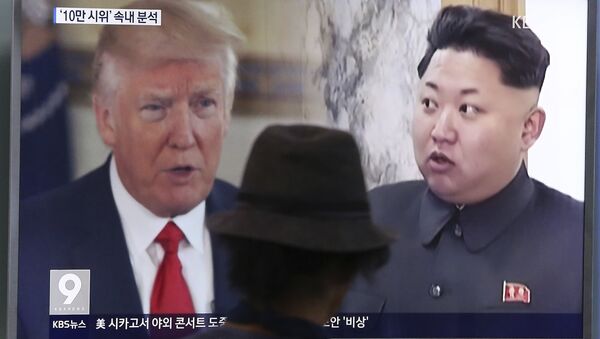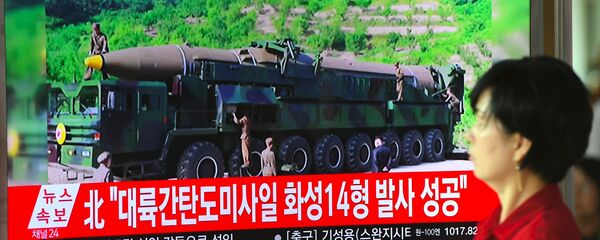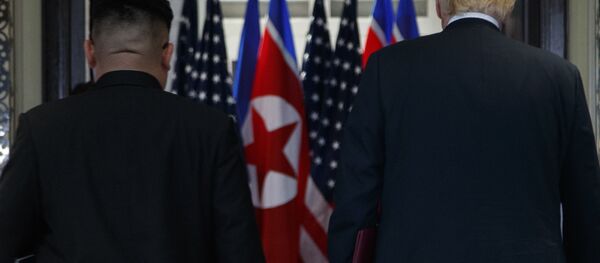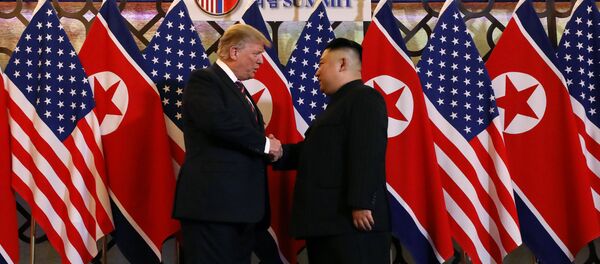Sputnik spoke about the US-North Korea summit in Vietnam and the situation in the region ahead of the summit with Stephen Nagy, a senior associate professor at the Department of Politics and International Studies at International Christian University (ICU), who is also a distinguished fellow at the Asia Pacific Foundation in Canada, a fellow at the Canadian Global Affairs Institute and a visiting fellow at the Japan Institute for International Affairs (JIIA).
Sputnik: What are your expectations from the meeting between Mr. Trump and Kim Jong-un?
Sputnik: How would you assess the progress of North Korea's denuclearisation since the Singapore summit last year?
Stephen Nagy: There hasn't been any progress. What we've seen actually is the North Koreans continue to refine uranium and plutonium material. We don't know for sure, but most open sources suggest that North Korea has continued to refine their nuclear capabilities and their missile launching capabilities through simulations, and there hasn't been an accounting of what kinds of weapons the North Koreans actually have. And what it suggests is that North Koreans have not moved at all away from their position on denuclearisation, which means denuclearisation of the entire Korean Peninsula and the region around the Korean Peninsula, which includes removing the US assets from the Korean Peninsula, most likely Japan and some of the bases that are found in the Asia-Pacific, including Guam. None of this has happened and at this stage most observers, including myself, believe that the denuclearization process is still far away.
READ MORE: Summit With No Result: Kim Doesn't Want to Match 'Trump's Dance Steps' — Analyst
Sputnik: Professor, earlier Kim Jong-un stated that Pyongyang would denuclearise if Washington removed its troops from South Korea. How likely is this to happen and what are the conditions North Korea is likely to put forward?
Sputnik: Professor, how much power does President Donald Trump have when it comes to removing sanctions imposed by Congress and how long could this process take if and when North Korea agrees to abandon its nuclear weapons?
Stephen Nagy: Well this is the challenge, what we've seen is in the United States they've adopted a law which links removing the sanctions to denuclearisation, so from the US's standpoint they cannot unilaterally remove sanctions until the denuclearisation process has happened legally. That being said, what the United States can do, working with other countries, is find some alternative steps to loosening some of the sanctions, and this could be removing targeted sanctions to allow, for example, food or some energy resources into the country, to allow medical aid, first aid, this would all be welcomed by Pyongyang, but would really require North Korea to engage in some kind of goodwill, in some kind of commitment to either normalising relations, demilitarising at some level, or normalising relations in terms of setting up liaison offices in both Washington and North Korea so that a real, substantial, daily or weekly dialogue can take place between these two countries.
READ MORE: Trump: US Refused Kim's Demand to Lift N Korea Sanctions (VIDEO)
Sputnik: Professor, could the lifting of sanctions happen during President Trump's current presidential term?
Sputnik: Professor, do you agree with Mr. Trump that Pyongyang would develop very quickly if it denuclearises?
Stephen Nagy: No, not really. I think there are some challenges and the comparison is Vietnam and China. When we look at both Vietnam and China in terms of their reform and opening up, they were largely agricultural societies which meant that they could move those individuals working in the agricultural sector into their manufacturing sector quite quickly. They were low skilled, they were low-paid and there were so many of those individuals that would be willing to work in those conditions and this provided both Vietnam and China with a platform for building a manufacturing network and to accrue capital to build their societies.
The challenge for North Korea is it's been largely industrialized, at least in Pyongyang and the bigger cities since the 1970's, so they wouldn't accrue the same instant gain from this cheap labour and moving such a large number of individuals into an industrial sector that's already established. So the formula has to be a little bit different and I suggest the formula, most likely, will be some kind of special economic zone in which North Korea uses its comparative advantages in terms of industrialisation to work either in factories that are supported by South Korea or other countries within the region. However, they wouldn't be able to move forward as quickly; there are just different conditions, different levels of development and, of course, North Korea is much more closed then both Vietnam and communist China were when they began to warm and open up.
The views and opinions expressed by the speaker do not necessarily reflect those of Sputnik.




